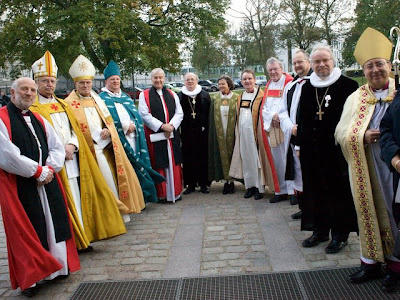The Revd Howard Levitt SSC Licensed in Venice

On Saturday 16th October the Revd Fr Howard Levitt SSC was licensed by Archdeacon of Italy and Malta, the Venerable Jonathan Boardman, as Chaplain of St George's Venice with St Anthony the Abbot, Padua and Christ Church, Trieste. Fr Howard comes to this diocese from the diocese of London where he was vicar of St Alban the Martyr, Holborn, a famous Anglo-Catholic shrine in the capital. We welcome Fr Howard to the Diocese in Europe. The photo below was taken after the service, with some of the visiting clergy and the Curate of the parish, the Revd Sampson Ajuka. The chaplaincy website is here .

















